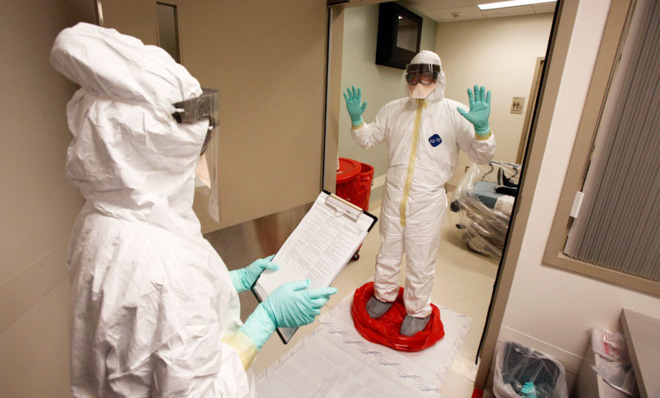When disease becomes political: The likely fallout from Ebola
What does Ebola mean for the midterms?

A free daily email with the biggest news stories of the day – and the best features from TheWeek.com
You are now subscribed
Your newsletter sign-up was successful

Could the Ebola scare affect the election? It may seem a bit crass to even address this question, but it's rare we see a national panic over a deadly disease erupt so close to an election, and candidates are already using the disease as a possible campaign issue. Just what effect might this have?
Probably the most direct analogy we have for this within U.S. politics is the outbreak of the Spanish Flu in 1918-19. Of course, in terms of sheer numbers, that was nothing like the current Ebola scare. The Spanish Flu killed half a million people — roughly half a percent of the American population at the time — while Ebola has, to date, killed one person in the United States. But politically, there are similarities; both are terrifying diseases whose outbreaks roughly coincide with a congressional mid-term election.
Chris Achen and Larry Bartels analyzed the political effects of the Spanish Flu in a famous paper that looked at the impact of natural disasters on American elections. Interestingly, while Achen and Bartels found that Americans blame their elected officials for things like shark attacks and droughts, they found no such impact for the flu. There was no disproportionate vote against the Democratic Party (then, like now, in control of the White House and the Senate) in the cities where the pandemic was most prevalent. It may simply be that given the state of public health programs at the time, Americans simply did not think of massive disease outbreaks in political terms; they didn't blame or credit national leaders for their response because none was expected.
The Week
Escape your echo chamber. Get the facts behind the news, plus analysis from multiple perspectives.

Sign up for The Week's Free Newsletters
From our morning news briefing to a weekly Good News Newsletter, get the best of The Week delivered directly to your inbox.
From our morning news briefing to a weekly Good News Newsletter, get the best of The Week delivered directly to your inbox.
So there's at least some evidence that voters will blame the party in power for natural disasters, although perhaps not all disasters. A paper by John Gasper and Andrew Reeves, however, suggests that voters actually consider the government's response to the disaster and assign rewards and punishments based on that. Indeed, they find that voters can distinguish between the actions of presidents and governors in response to damaging storms. That voters can evaluate the government's response to a disaster might explain why Superstorm Sandy didn't hurt President Obama's re-election bid in 2012 and may have actually helped it, while Hurricane Katrina did President Bush no favors.
Perhaps, however, there's a large partisan effect at play. Claude Berrebi and Esteban Klor examined local elections in Israel that occurred within a few months of nearby terror attacks and found that an attack was associated with a 1.4-point increase in the vote for the conservative parties. Presumably voters became more comfortable with right-leaning parties due to the fear and insecurity created by terrorist attacks.
What might all of this mean for the current American elections? Shepard Smith said it very well on Fox News:
With mid-term elections coming, the party in charge needs to appear to be effectively leading. The party out of power needs to show that there is a lack of leadership. So the president has canceled fundraising and is holding meetings, and his political opponents are accusing his administration of poor leadership. [Fox News]
It's possible that the current Ebola scare is undermining American's sense of security and well-being, even while not directly threatening their lives. It's also possible that this sense of insecurity has become politicized in Americans' minds, such that they — consciously or unconsciously — blame Obama for the climate of fear and will punish Democrats for it in the election. But what beyond that? Will they credit or punish Democrats for Obama's handling of the situation? Will they turn to Republicans to protect them during times of crisis?
A free daily email with the biggest news stories of the day – and the best features from TheWeek.com
It's also entirely possible that Americans' attention will turn to other matters in the next few days. But given that early voting is already occurring in several states, the Ebola effect, to the extent there is one, is already embedded into the 2014 elections. We'll know soon just how large it was.
Pacific Standard grapples with the nation's biggest issues by illuminating why we do what we do. For more on the science of society, sign up for its weekly email update or subscribe to its bimonthly print magazine.
More from Pacific Standard...